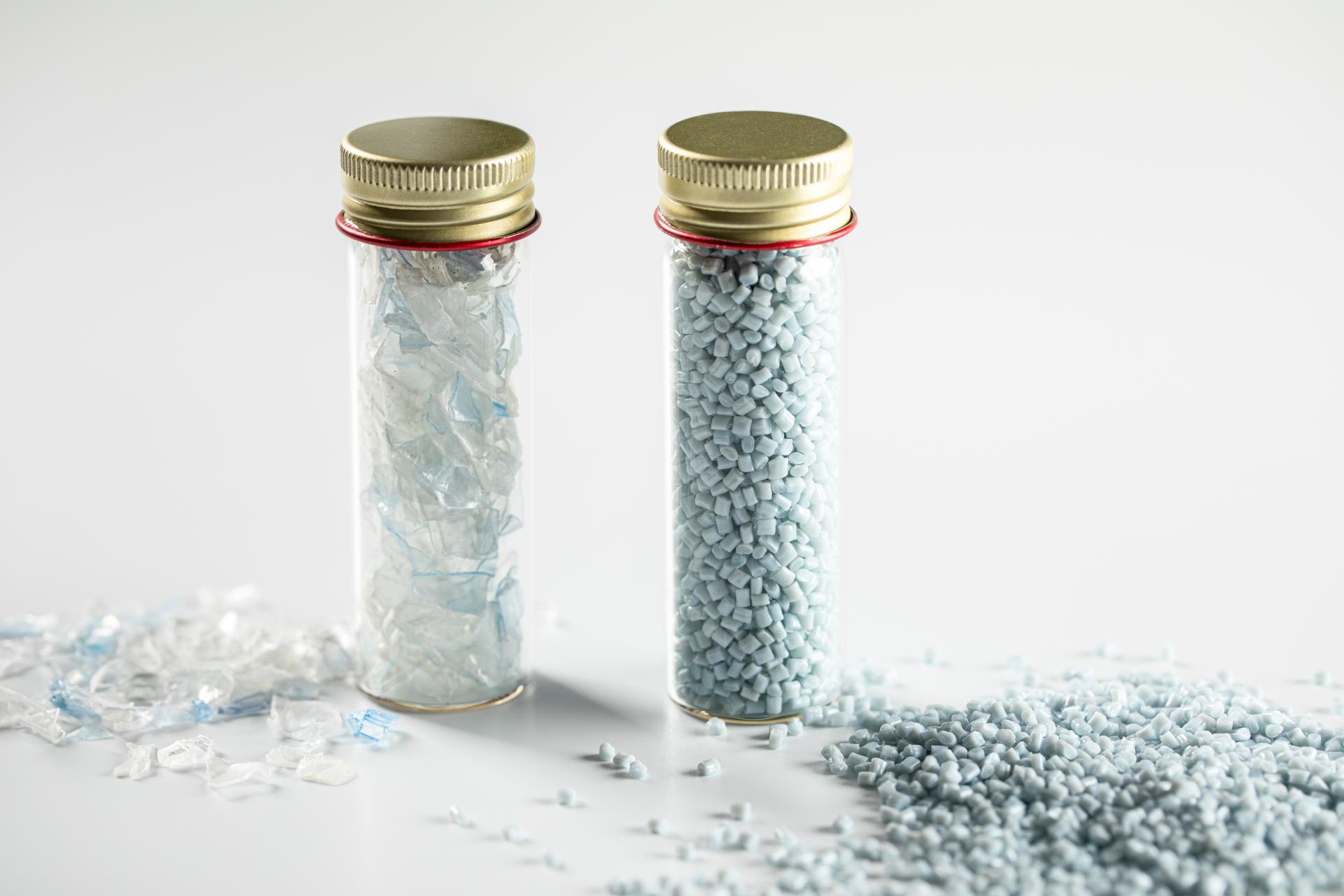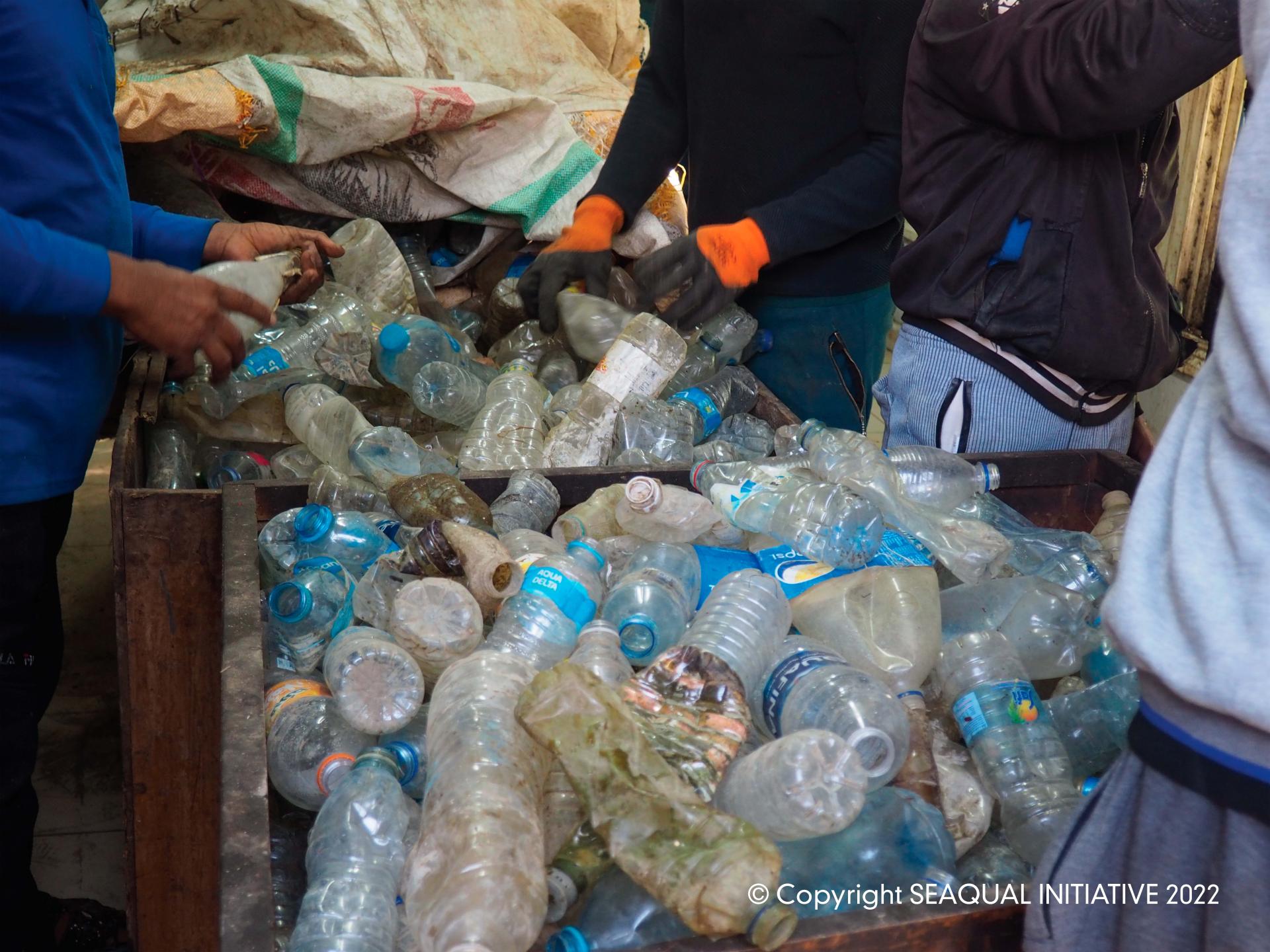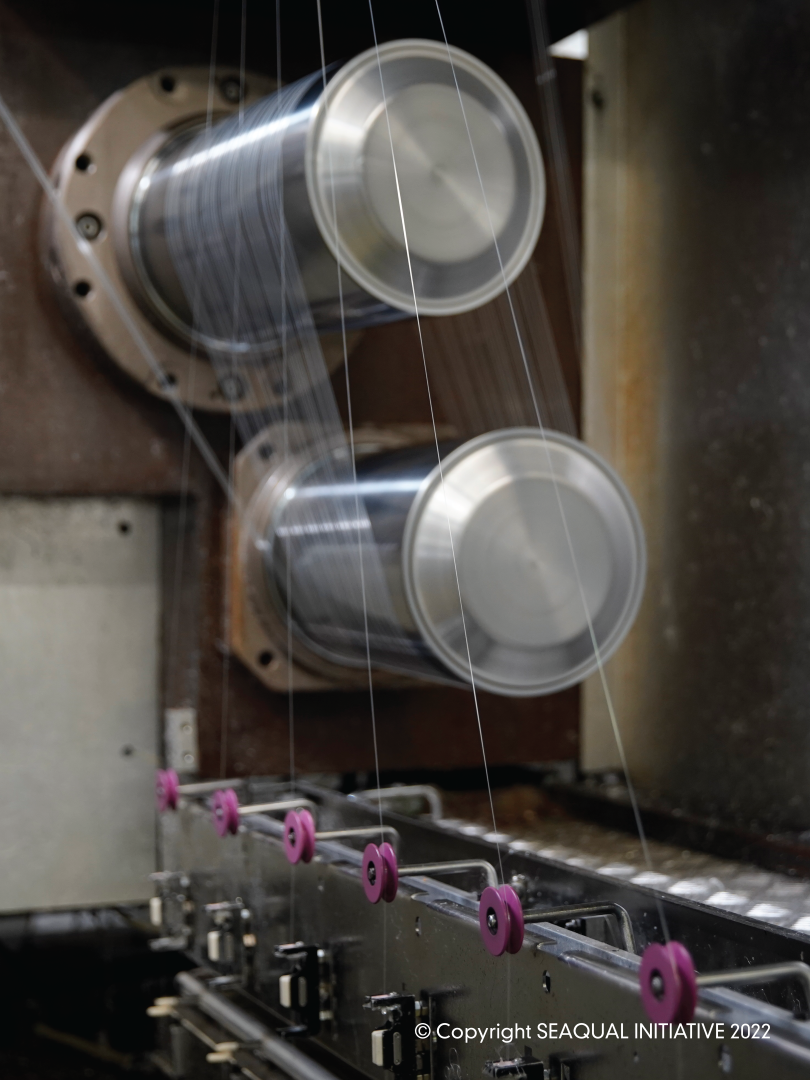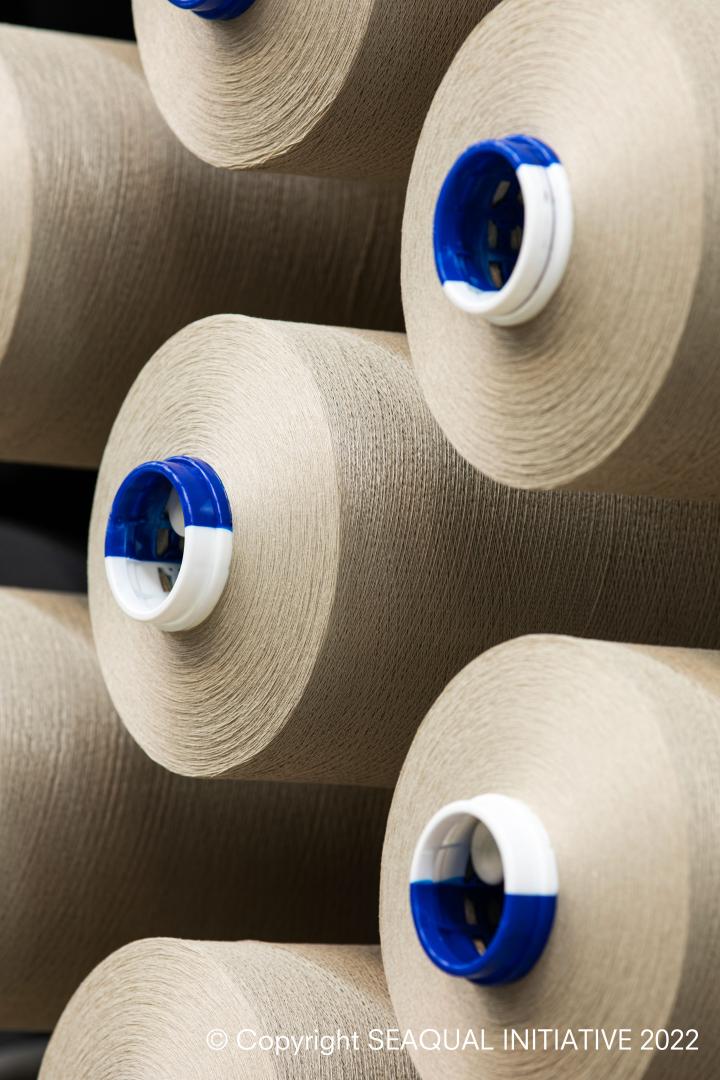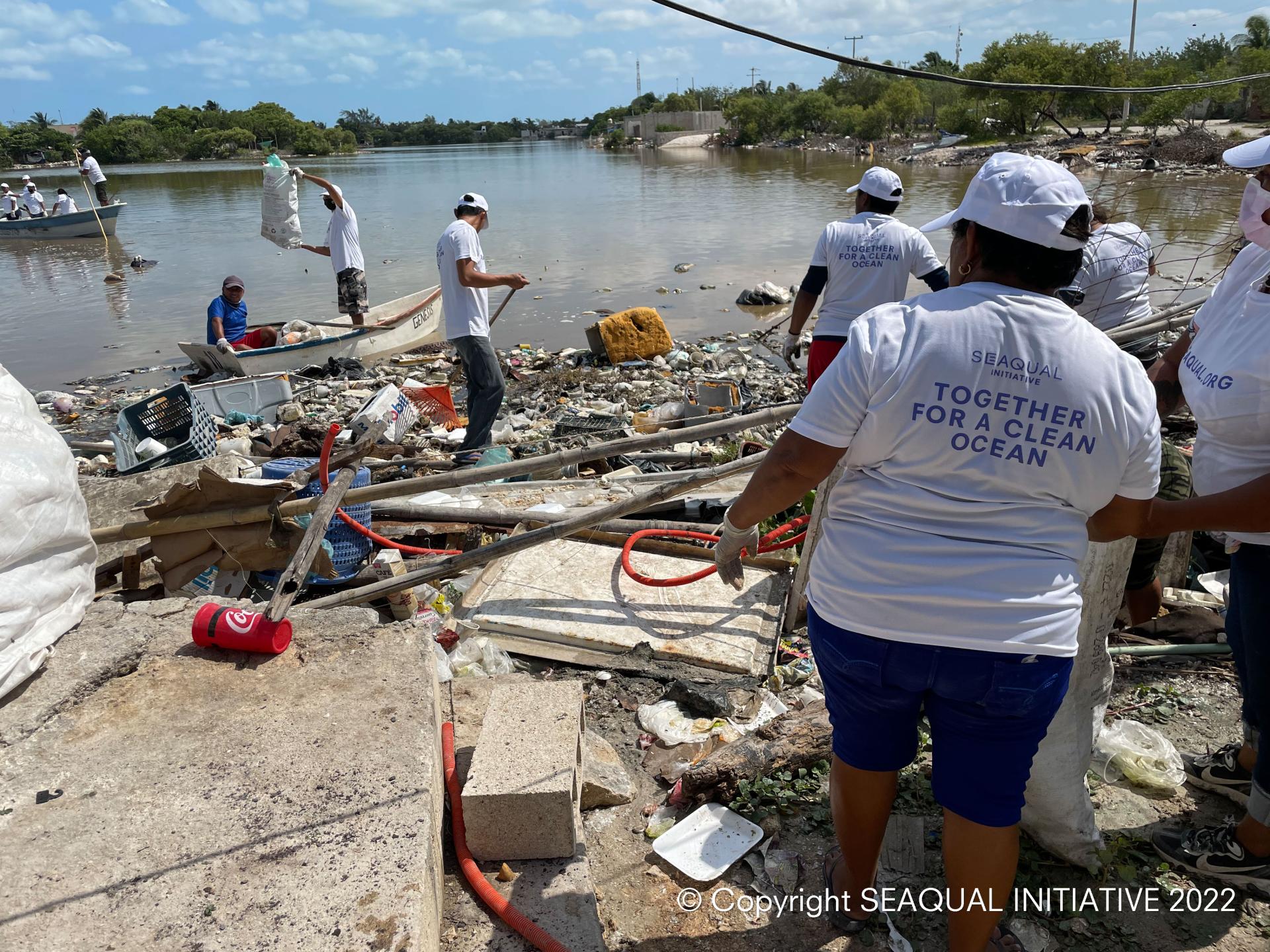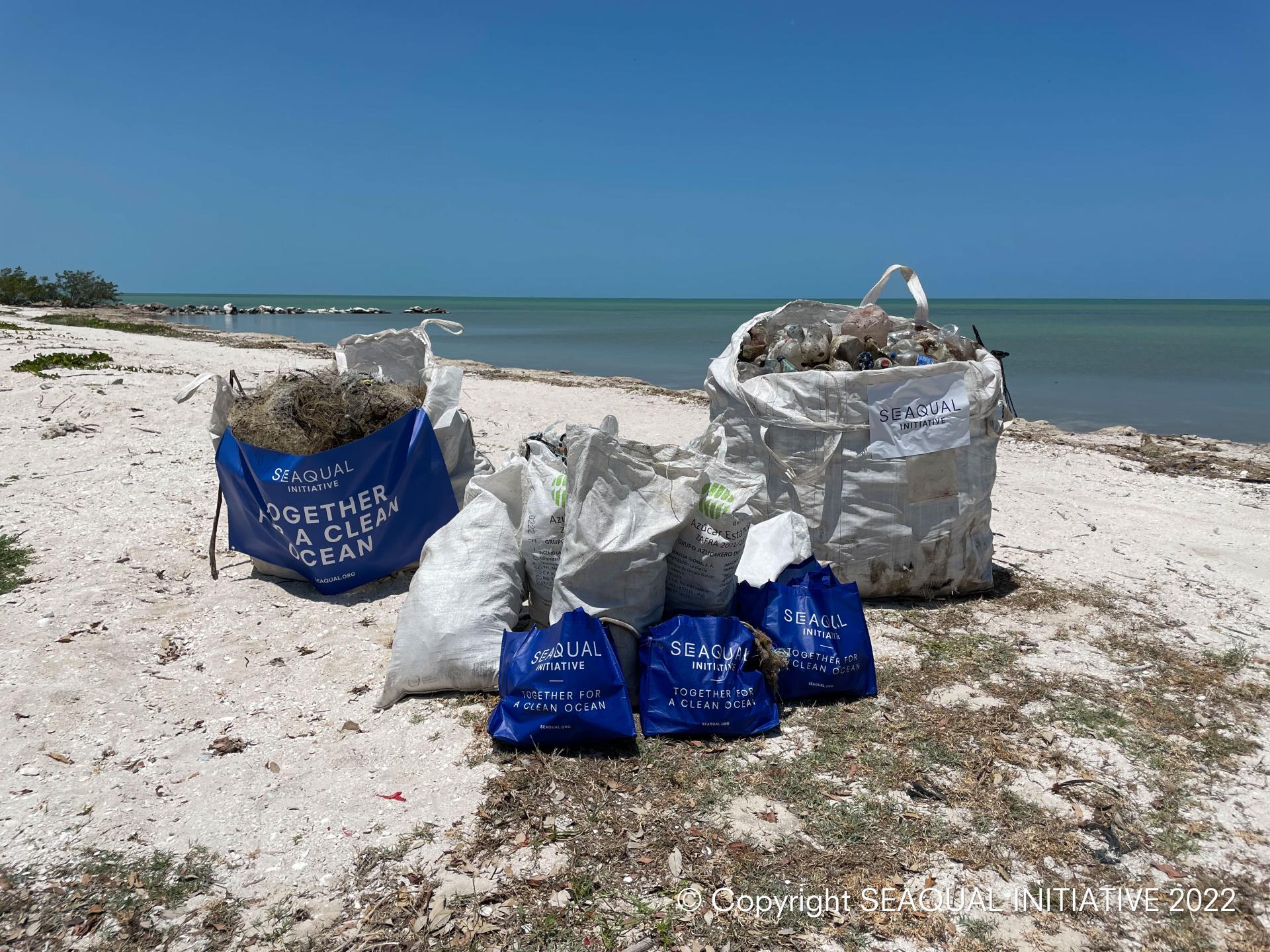SEAQUAL INITIATIVE
Basic information
Project Title
SEAQUAL INITIATIVE
Full project title
Together for a clean ocean
Category
Shaping a circular industrial ecosystem and supporting life-cycle thinking
Project Description
SEAQUAL INITIATIVE is a unique collaborative community fighting marine plastic pollution. By working together to clean our environment, we help protect the ocean and biodiversity, and restore its natural, healthy state.
But we do not stop there. We continue to aim for a positive impact by upcycling the marine plastic we collect into an innovative, 100% recycled textile solution, which has already given life to many sustainable products.
But we do not stop there. We continue to aim for a positive impact by upcycling the marine plastic we collect into an innovative, 100% recycled textile solution, which has already given life to many sustainable products.
Geographical Scope
Regional
Project Region
The headquarters of the project are located in Anglès (Catalonia). However, our cleaning activity takes place in developing countries, in regions where plastic pollution is a big contributor to health issues and inequality: Mexico, Tunisia, Egypt and Vietnam. , Spain
Urban or rural issues
Mainly rural
Physical or other transformations
It refers to other types of transformations (soft investment)
EU Programme or fund
No
Description of the project
Summary
Plastic pollution is an increasingly concerning issue. It is estimated that over 14 million tons of plastic reach the ocean every year, and once there, it breaks into microplastics, which pose a significant threat to all living beings, both in and out of water. Recently, many studies have found evidence of microplastics in our food and even in our blood.
After studying the market, we realized that although other companies work with recycled plastic, something was missing. Other companies work with Ocean Bound Plastic, that is, plastic at risk of ending up in the ocean but that can actually be found 50km from the coast. This plastic, although it also pollutes, does not yet represent a threat of becoming microplastics. This is why SEAQUAL INITIATIVE decided to work directly with plastic at its most critical point, which represents a significant threat to the ocean and biodiversity. And we do this by collecting plastic from the actual ocean, rivers and shorelines.
We collaborate with NGOs, cleaning programs, local communities, authorities, activists and more to clean the environment and give a new life to the waste collected, in the form of a sustainable and 100% recycled textile solution.
This solution, called SEAQUAL® YARN, is purchased by manufacturers and brands that want to improve the positive impact of their activity on the environment and society.
Since our start in 2016, we have achieved several positive results:
-Around 800 tons of marine litter collected, 290 of which have been transformed into SEAQUAL® MARINE PLASTIC.
-Reduced our impact in comparison to virgin polyester, producing 37% less CO2 emissions, 34% less water consumption and 40% less energy consumption.
- First circular achievement in sportswear: created a completely circular loop with Puma for their “Re:Jersey” campaign, using 75% recycled jerseys and 25% SEAQUAL® YARN.
-Four collection points located in developing, vulnerable areas: Mexico, Tunisia, Egypt and Vietnam.
After studying the market, we realized that although other companies work with recycled plastic, something was missing. Other companies work with Ocean Bound Plastic, that is, plastic at risk of ending up in the ocean but that can actually be found 50km from the coast. This plastic, although it also pollutes, does not yet represent a threat of becoming microplastics. This is why SEAQUAL INITIATIVE decided to work directly with plastic at its most critical point, which represents a significant threat to the ocean and biodiversity. And we do this by collecting plastic from the actual ocean, rivers and shorelines.
We collaborate with NGOs, cleaning programs, local communities, authorities, activists and more to clean the environment and give a new life to the waste collected, in the form of a sustainable and 100% recycled textile solution.
This solution, called SEAQUAL® YARN, is purchased by manufacturers and brands that want to improve the positive impact of their activity on the environment and society.
Since our start in 2016, we have achieved several positive results:
-Around 800 tons of marine litter collected, 290 of which have been transformed into SEAQUAL® MARINE PLASTIC.
-Reduced our impact in comparison to virgin polyester, producing 37% less CO2 emissions, 34% less water consumption and 40% less energy consumption.
- First circular achievement in sportswear: created a completely circular loop with Puma for their “Re:Jersey” campaign, using 75% recycled jerseys and 25% SEAQUAL® YARN.
-Four collection points located in developing, vulnerable areas: Mexico, Tunisia, Egypt and Vietnam.
Key objectives for sustainability
Being aware of the crisis our planet is facing and the damage that plastic pollution has on the ocean, biodiversity and climate, we felt that we had to use our resources to bring about great change and spread the message to the community.
Additionally, we aimed for maximum transparency, which led us to develop a licensing system. Through this system, all manufacturers and brands buying, selling, and/or promoting SEAQUAL® YARN or its derived products are registered on our platform. This allows us to ensure material traceability, monitor that SEAQUAL Licensees communicate honestly and accurately (to prevent greenwashing), and maximize the impact of our work by spreading the message, raising awareness, and increasing ocean cleaning activities.
Although we are a company with a product, our objectives have always focused on social and environmental protection and development:
-Clean the oceans, coasts and rivers of plastic to help them and their biodiversity recover their natural state and continue developing. We currently have 4 collection points for this.
-Disseminate knowledge about plastic pollution to raise awareness and help companies and consumers pivot towards more sustainable practices. We rely on scientists, athletes, artists and more (our so-called “Heroes”) to transmit their knowledge and passion for the ocean.
-Fight against production systems that continue to aggravate plastic pollution. We share knowledge and advocate for a circular industry.
-Support manufacturers and brands to introduce more sustainable practices and materials into their production chain.
-Be a pioneer company in the introduction of circular systems, with textile-to-textile processes.
-Practice our words. Our production process tries to reduce its negative impact on the environment and maximize the positive one through the education of local communities, promotion of local economies, local transformation processes, etc.
Additionally, we aimed for maximum transparency, which led us to develop a licensing system. Through this system, all manufacturers and brands buying, selling, and/or promoting SEAQUAL® YARN or its derived products are registered on our platform. This allows us to ensure material traceability, monitor that SEAQUAL Licensees communicate honestly and accurately (to prevent greenwashing), and maximize the impact of our work by spreading the message, raising awareness, and increasing ocean cleaning activities.
Although we are a company with a product, our objectives have always focused on social and environmental protection and development:
-Clean the oceans, coasts and rivers of plastic to help them and their biodiversity recover their natural state and continue developing. We currently have 4 collection points for this.
-Disseminate knowledge about plastic pollution to raise awareness and help companies and consumers pivot towards more sustainable practices. We rely on scientists, athletes, artists and more (our so-called “Heroes”) to transmit their knowledge and passion for the ocean.
-Fight against production systems that continue to aggravate plastic pollution. We share knowledge and advocate for a circular industry.
-Support manufacturers and brands to introduce more sustainable practices and materials into their production chain.
-Be a pioneer company in the introduction of circular systems, with textile-to-textile processes.
-Practice our words. Our production process tries to reduce its negative impact on the environment and maximize the positive one through the education of local communities, promotion of local economies, local transformation processes, etc.
Key objectives for aesthetics and quality
When starting SEAQUAL INITIATIVE, it was important for us that we reduced the negative impact while also improving the positive one. Not only on the environment, but also on society. Specifically, we work with amazing local communities that help us collect the marine plastic. Their lives are not easy; they usually enjoy less privileges, bad work conditions, inhuman wages, no access to clean water, etc.
And this is one of the reasons we chose to work in Mexico, Tunisia, Egypt and Vietnam. These countries are highly affected by plastic pollution, which causes health issues among others. Therefore, we found that by working with these communities, not only would we help them have a clean, healthy area for them and future generations, but we could also give back to them with a higher positive impact and meaningfulness.
Specifically, we help them in several ways, the first one being cost-related; we pay for the plastic they collect at a higher rate than on the market. This allows them to improve their income, invest in more effective systems and machines, have better work conditions, etc. We have also worked with local NGOs to fund workshops and help raise awareness within the community.
On the other hand, we are working on starting the SEAQUAL Foundation, which will allow us to take our social impact further through the funding of educational projects, research, conservation programs and more. We count on receiving donations from our committed clients, but the cost of initial implementation will be around 50-60K.
And this is one of the reasons we chose to work in Mexico, Tunisia, Egypt and Vietnam. These countries are highly affected by plastic pollution, which causes health issues among others. Therefore, we found that by working with these communities, not only would we help them have a clean, healthy area for them and future generations, but we could also give back to them with a higher positive impact and meaningfulness.
Specifically, we help them in several ways, the first one being cost-related; we pay for the plastic they collect at a higher rate than on the market. This allows them to improve their income, invest in more effective systems and machines, have better work conditions, etc. We have also worked with local NGOs to fund workshops and help raise awareness within the community.
On the other hand, we are working on starting the SEAQUAL Foundation, which will allow us to take our social impact further through the funding of educational projects, research, conservation programs and more. We count on receiving donations from our committed clients, but the cost of initial implementation will be around 50-60K.
Key objectives for inclusion
We put great value in the local communities that work hard to help us protect the ocean. We wanted to give back to them, which is something we do by paying a stable, higher rate for the plastic than the market throughout the whole year.
This small detail helps vulnerable groups to have a steady and dignified income, which contributes to higher accessibility to healthcare, education, and utilities. and allows companies to create more jobs and invest in better, more efficient machinery to make work conditions better.
But not everything is money. We also contribute directly through educational workshops on recycling and the effects of plastic pollution. We aim to achieve a potent ESG perspective in all our choices, from partnering with companies that solidly comply with work and human rights, to maximizing the number of transformation processes carried out locally to avoid unnecessary emissions.
This small detail helps vulnerable groups to have a steady and dignified income, which contributes to higher accessibility to healthcare, education, and utilities. and allows companies to create more jobs and invest in better, more efficient machinery to make work conditions better.
But not everything is money. We also contribute directly through educational workshops on recycling and the effects of plastic pollution. We aim to achieve a potent ESG perspective in all our choices, from partnering with companies that solidly comply with work and human rights, to maximizing the number of transformation processes carried out locally to avoid unnecessary emissions.
Results in relation to category
ENVIRONMENTAL IMPACT
To this day, we have collected around 800 tons of marine litter, out of which 290 have been transformed into SEAQUAL® MARINE PLASTIC, avoiding that they turn into microplastics and cause damage to the environment. According to our latest LCA, our transformation process reduces by 37% CO2 emissions, 34% water use and 40% energy use compared to virgin polyester.
SOCIAL IMPACT
In just three years, we have grown from 50 to over 2000 SEAQUAL Licensees, thanks to the positive market reception of SEAQUAL® YARN. We are a well-established brand within sectors such as fashion, merchandising, furnishing, and automotive.
On the other hand, we always strive to leave a positive impact where we collect plastic. It’s because of this that we work with local communities to stimulate their industrial development, improve work opportunities and conditions, raise awareness and enhance their economy by buying the plastic at a higher rate than on the market.
Finally, thanks to our recent growth, we have been able to open 2 collection points during 2022 (Tunisia and Vietnam) as well as create 2 more jobs in our team.
ECONOMIC IMPACT
Regarding the economic impact of SEAQUAL INITIATIVE, as part of our support to the communities we buy the plastic they collect at a higher price than on the market. This allows them to continue developing their activity and in better conditions.
On the other hand, our product is more expensive compared to virgin polyester. This is due to the collection, transformation and transportation processes behind its production. As is often the case with many sustainable solutions, the final price turns out to be more expensive than if polluting materials are used.
Even so, it is thanks to this process that SEAQUAL® YARN provides great added value to our clients' products, allowing them to expand their storytelling, their CSR and, therefore, increase the final price to the client.
To this day, we have collected around 800 tons of marine litter, out of which 290 have been transformed into SEAQUAL® MARINE PLASTIC, avoiding that they turn into microplastics and cause damage to the environment. According to our latest LCA, our transformation process reduces by 37% CO2 emissions, 34% water use and 40% energy use compared to virgin polyester.
SOCIAL IMPACT
In just three years, we have grown from 50 to over 2000 SEAQUAL Licensees, thanks to the positive market reception of SEAQUAL® YARN. We are a well-established brand within sectors such as fashion, merchandising, furnishing, and automotive.
On the other hand, we always strive to leave a positive impact where we collect plastic. It’s because of this that we work with local communities to stimulate their industrial development, improve work opportunities and conditions, raise awareness and enhance their economy by buying the plastic at a higher rate than on the market.
Finally, thanks to our recent growth, we have been able to open 2 collection points during 2022 (Tunisia and Vietnam) as well as create 2 more jobs in our team.
ECONOMIC IMPACT
Regarding the economic impact of SEAQUAL INITIATIVE, as part of our support to the communities we buy the plastic they collect at a higher price than on the market. This allows them to continue developing their activity and in better conditions.
On the other hand, our product is more expensive compared to virgin polyester. This is due to the collection, transformation and transportation processes behind its production. As is often the case with many sustainable solutions, the final price turns out to be more expensive than if polluting materials are used.
Even so, it is thanks to this process that SEAQUAL® YARN provides great added value to our clients' products, allowing them to expand their storytelling, their CSR and, therefore, increase the final price to the client.
How Citizens benefit
Different social groups benefit from our project. First of all, there are the waste collectors we work with. These groups are in a vulnerable position due to living in developing areas with hard access to healthcare and education. Combined with the high levels of plastic pollution they suffer, this becomes a terrible mix for their health and well-being.
We work with local communities through NGOs, in order to collect marine litter from their environment (beaches, ocean and rivers). By doing this, they get to live in a cleaner region, while we provide a higher income to help have more accessibility to basic needs and have better machinery to continue developing their work in better conditions.
On the other side, we find consumers. In the past few years, we have seen a growing demand for sustainable products that have been created under responsible policies. Therefore, we offer a recycled alternative that can be applied to an infinite variety of products to take sustainability to more and more consumers.
We work with local communities through NGOs, in order to collect marine litter from their environment (beaches, ocean and rivers). By doing this, they get to live in a cleaner region, while we provide a higher income to help have more accessibility to basic needs and have better machinery to continue developing their work in better conditions.
On the other side, we find consumers. In the past few years, we have seen a growing demand for sustainable products that have been created under responsible policies. Therefore, we offer a recycled alternative that can be applied to an infinite variety of products to take sustainability to more and more consumers.
Physical or other transformations
It refers to other types of transformations (soft investment)
Innovative character
SEAQUAL INITIATIVE seeks to be a pioneer and innovative company in the production of sustainable materials through different aspects:
-We recover plastic from the ocean, rivers and coasts, where it is in its greatest state of degradation before becoming microplastics. This unique approach allows us to fight plastic pollution and protect the oceans and biodiversity more effectively.
-We have a free licensing system in which any company that wants to buy, sell or communicate SEAQUAL® YARN must be registered. This allows us to improve our traceability and transparency by tracking where our product is and what is done. Our license also makes it possible to offer all our clients marketing and information material, the possibility of certifying that their fabric contains our material, supervising that their communication is honest... All with the aim of preventing greenwashing and fraudulent uses.
-Our two products, SEAQUAL® YARN and SEAQUAL® MARINE PLASTIC, have great versatility of uses. SEAQUAL® YARN can be used to make clothing, watch straps, shoes, towels, mattresses, sheets, car seats, bags, backpacks, furniture coverings, decoration, roll-ups, posters, lanyards, bracelets and much more.
On the other hand, SEAQUAL® MARINE PLASTIC is the raw material resulting from the transformation of plastic waste into pellets for subsequent conversion into thread. These pellets can be used for injection molding, useful for products such as buckets, car elements (dashboards, bumpers, glove boxes), cleaning materials (mops, dustpans, etc.), glasses frames, furniture structures (office chairs), etc.
-Our transformation process right now is based on mechanical recycling. However, we are studying the possibility of introducing chemical recycling, which would allow us to return the plastic to monomer and introduce our product in the food and beverage sector, increase the amount of marine litter in it and achieve circular processes.
-We recover plastic from the ocean, rivers and coasts, where it is in its greatest state of degradation before becoming microplastics. This unique approach allows us to fight plastic pollution and protect the oceans and biodiversity more effectively.
-We have a free licensing system in which any company that wants to buy, sell or communicate SEAQUAL® YARN must be registered. This allows us to improve our traceability and transparency by tracking where our product is and what is done. Our license also makes it possible to offer all our clients marketing and information material, the possibility of certifying that their fabric contains our material, supervising that their communication is honest... All with the aim of preventing greenwashing and fraudulent uses.
-Our two products, SEAQUAL® YARN and SEAQUAL® MARINE PLASTIC, have great versatility of uses. SEAQUAL® YARN can be used to make clothing, watch straps, shoes, towels, mattresses, sheets, car seats, bags, backpacks, furniture coverings, decoration, roll-ups, posters, lanyards, bracelets and much more.
On the other hand, SEAQUAL® MARINE PLASTIC is the raw material resulting from the transformation of plastic waste into pellets for subsequent conversion into thread. These pellets can be used for injection molding, useful for products such as buckets, car elements (dashboards, bumpers, glove boxes), cleaning materials (mops, dustpans, etc.), glasses frames, furniture structures (office chairs), etc.
-Our transformation process right now is based on mechanical recycling. However, we are studying the possibility of introducing chemical recycling, which would allow us to return the plastic to monomer and introduce our product in the food and beverage sector, increase the amount of marine litter in it and achieve circular processes.
Disciplines/knowledge reflected
Our project has benefited from the cooperation between various disciplines. We are talking about scientists, authorities, NGOs, waste collectors, fishermen, manufacturers from the textile industry, brands, communication specialists, business development, and much more.
All these disciplines have helped make SEAQUAL INITIATIVE what it is today and take the concept to more people, to encourage consumers to get educated and to inspire brands to choose sustainable materials.
All these disciplines have helped make SEAQUAL INITIATIVE what it is today and take the concept to more people, to encourage consumers to get educated and to inspire brands to choose sustainable materials.
Methodology used
SEAQUAL INITIATIVE was founded six years ago when we started collaborating primarily with fishermen to retrieve plastic they encountered while fishing. We initially used this plastic for testing different combinations and transformation processes, and it was not until 2018 that we officially began selling our product, SEAQUAL® YARN.
To this day, we have expanded our network of collaborators to include clean-up programs, sorting and processing plants, NGOs, social projects, local communities, scientists, athletes, authorities, and more. Furthermore, SEAQUAL® YARN is purchased by manufacturers and brands that share our values and strive to improve their sustainable footprint by offering their customers a responsible solution.
We currently have four collection points (Mexico, Tunisia, Egypt, and Vietnam), we have collected approximately 800 tons of marine plastic and have welcomed over 2000 SEAQUAL Licensees.
In order to implement our business model, we had to carefully study each collection point and identify its environmental and social impact.
-Mexico: our collection point in Mexico counts on a completely vertical chain in order to avoid unnecessary CO2 emissions. Once marine litter is gathered, it’s sorted, washed and transformed by local partners. The spinning process is carried out by ANTEX’s plant in Mexico. This allows us to distribute to all America without moving the product to Europe.
-Tunisia and Egypt: in both locations, the sorting and shredding is carried out with local partners. After this, the marine plastic is transported to Europe where it’s turned into pellets (SEAQUAL® MARINE PLASTIC) and spinned (SEAQUAL® YARN).
-Vietnam: different to the other 3 collection points, in Vietnam we collect PP (fishing nets and ropes). This polymer is locally transformed all the way to reusable PP bags by a local partner.
To this day, we have expanded our network of collaborators to include clean-up programs, sorting and processing plants, NGOs, social projects, local communities, scientists, athletes, authorities, and more. Furthermore, SEAQUAL® YARN is purchased by manufacturers and brands that share our values and strive to improve their sustainable footprint by offering their customers a responsible solution.
We currently have four collection points (Mexico, Tunisia, Egypt, and Vietnam), we have collected approximately 800 tons of marine plastic and have welcomed over 2000 SEAQUAL Licensees.
In order to implement our business model, we had to carefully study each collection point and identify its environmental and social impact.
-Mexico: our collection point in Mexico counts on a completely vertical chain in order to avoid unnecessary CO2 emissions. Once marine litter is gathered, it’s sorted, washed and transformed by local partners. The spinning process is carried out by ANTEX’s plant in Mexico. This allows us to distribute to all America without moving the product to Europe.
-Tunisia and Egypt: in both locations, the sorting and shredding is carried out with local partners. After this, the marine plastic is transported to Europe where it’s turned into pellets (SEAQUAL® MARINE PLASTIC) and spinned (SEAQUAL® YARN).
-Vietnam: different to the other 3 collection points, in Vietnam we collect PP (fishing nets and ropes). This polymer is locally transformed all the way to reusable PP bags by a local partner.
How stakeholders are engaged
Our community is shaped by a wide range of stakeholders, but we find two that have more influence on our project. These are our client companies, our collection partners and the shareholders.
The collection partners are the big force of work, they help us collect the marine litter that will be later transformed into recycled material. It was important for us to choose partners that showed respect and complied with human rights, but that also shared our values of sustainability and had policies to reduce their impact in place.
Our client companies, over 2.000, have immensely helped us introduce our product to a huge variety of products in the merchandising, automotive, fashion and furnishing sectors.
Finally, we exist because two big European textile manufacturers joined forces to fight for a greener future: Antex and VICA. These two companies are our shareholders, and they bring with them years of expertise and developed R+D.
The collection partners are the big force of work, they help us collect the marine litter that will be later transformed into recycled material. It was important for us to choose partners that showed respect and complied with human rights, but that also shared our values of sustainability and had policies to reduce their impact in place.
Our client companies, over 2.000, have immensely helped us introduce our product to a huge variety of products in the merchandising, automotive, fashion and furnishing sectors.
Finally, we exist because two big European textile manufacturers joined forces to fight for a greener future: Antex and VICA. These two companies are our shareholders, and they bring with them years of expertise and developed R+D.
Global challenges
With our project, we tackle 3 important SDGs:
SDG 12: RESPONSIBLE CONSUMPTION AND PRODUCTION
On the production side, we keep processes as local as possible, to avoid generating unnecessary emissions through transportation. Socially, we pay for plastic at a higher price than the market, providing our collaborators with more decent salaries and better working conditions (through the purchase of more efficient machinery, for example).
On the consumer side, we share a large number of sources of information and marketing materials with our licensees, and we monitor their communication to avoid greenwashing. Likewise, at SEAQUAL we also work to educate consumers directly through our social networks, website and local cleaning activities.
SDG 13: CLIMATE ACTION
On the environmental side, we try to ensure that our production chain has as low an impact as possible, through the use of local companies and washing, dyeing, etc. processes. more eco-friendly. For example, we use “dope dye” for our yarn, which gets rid of bath dyes and thus prevents the creation of microplastics.
On the community side, we work with NGOs to carry out recycling workshops in the communities with which we collaborate. We also try to organize local cleanups that help spread our message and educate children, families, and anyone who volunteers.
SDG 14: LIFE BELOW WATER
Plastic pollution is an increasingly serious problem. It is estimated that almost 13 million tons of plastic reach the ocean each year, and once there, weather conditions quickly convert them into microplastics. These particles are ingested by living beings, causing health problems and entering the food chain, and damaging other essential ecosystems, such as coral reefs.
With our project, we eliminate plastic of the environment, contributing to the protection of marine biodiversity and helping its healthy development.
SDG 12: RESPONSIBLE CONSUMPTION AND PRODUCTION
On the production side, we keep processes as local as possible, to avoid generating unnecessary emissions through transportation. Socially, we pay for plastic at a higher price than the market, providing our collaborators with more decent salaries and better working conditions (through the purchase of more efficient machinery, for example).
On the consumer side, we share a large number of sources of information and marketing materials with our licensees, and we monitor their communication to avoid greenwashing. Likewise, at SEAQUAL we also work to educate consumers directly through our social networks, website and local cleaning activities.
SDG 13: CLIMATE ACTION
On the environmental side, we try to ensure that our production chain has as low an impact as possible, through the use of local companies and washing, dyeing, etc. processes. more eco-friendly. For example, we use “dope dye” for our yarn, which gets rid of bath dyes and thus prevents the creation of microplastics.
On the community side, we work with NGOs to carry out recycling workshops in the communities with which we collaborate. We also try to organize local cleanups that help spread our message and educate children, families, and anyone who volunteers.
SDG 14: LIFE BELOW WATER
Plastic pollution is an increasingly serious problem. It is estimated that almost 13 million tons of plastic reach the ocean each year, and once there, weather conditions quickly convert them into microplastics. These particles are ingested by living beings, causing health problems and entering the food chain, and damaging other essential ecosystems, such as coral reefs.
With our project, we eliminate plastic of the environment, contributing to the protection of marine biodiversity and helping its healthy development.
Learning transferred to other parties
So far, we have successfully implemented our project in America (collection point and vertical industrial process in Mexico) and Europe (through our collection points in Tunisia and Egypt).
Our goal is to create a vertical supply chain in Asia as well, parting from our collection point in Vietnam and other potential locations. As of now, we have a solution for SEAQUAL® MARINE PLASTIC in the shape of reusable bags, but we would like to diversify this product to other applications, as well as introduce SEAQUAL® YARN.
In order to achieve this, we need to find trustworthy partners that can complete the missing steps in our supply chain. We always aim to partner up with companies that share our same values, respect their workers and have a low environmental impact, so this will also be important in the setting up process.
On the other hand, we aim to continue opening more collection points in areas where they are heavily affected by plastic pollution. As a start, we are discussing a consortium project with France and South Africa in Pretoria.
Another direction is to open collection points in collaboration with our biggest clients from the automotive field. These companies have a high demand for volume and they could bring stable purchases and ensure a steady income for the clean-up team.
Our goal is to create a vertical supply chain in Asia as well, parting from our collection point in Vietnam and other potential locations. As of now, we have a solution for SEAQUAL® MARINE PLASTIC in the shape of reusable bags, but we would like to diversify this product to other applications, as well as introduce SEAQUAL® YARN.
In order to achieve this, we need to find trustworthy partners that can complete the missing steps in our supply chain. We always aim to partner up with companies that share our same values, respect their workers and have a low environmental impact, so this will also be important in the setting up process.
On the other hand, we aim to continue opening more collection points in areas where they are heavily affected by plastic pollution. As a start, we are discussing a consortium project with France and South Africa in Pretoria.
Another direction is to open collection points in collaboration with our biggest clients from the automotive field. These companies have a high demand for volume and they could bring stable purchases and ensure a steady income for the clean-up team.
Keywords
marine plastic pollution
recycled plastic
sustainable materials
circularity
upcycling

